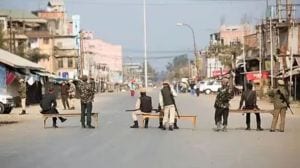The fight for transparency
This is the battle for accountability. After Rajasthan, Tamil Nadu and Goa,it is Maharashtra's turn as Anna Hazare campaigns for the right...

This is the battle for accountability. After Rajasthan, Tamil Nadu and Goa,it is Maharashtra8217;s turn as Anna Hazare campaigns for the right toinformation. What he is hoping to do is repeat the success of a movementthat took place in Rajasthan and changed the face of the campaign for a moreaccountable government establishment.
Unfortunately, reports filtering in from various parts of the state indicatethat Anna is failing to generate the same kind of interest that his earliercampaigns invoked.
Perhaps, this could be why successive governments have been able to get awaywith making all the right noises about the proposed Bill but neverimplementing it. And even though it has been promised for a long time bysuccessive governments, the Bill has gathered dust in the corridors ofParliament.
But the million dollar question is, will the Bill in its present form beeffective? Or will it prove to be an exercise in 8220;political convenience8221;as has been the experience when some State governments implemented theirversion of the Bill?
8220;I do not think that the government is keen on implementing the Bill atall,8221;says Madhav Godbole, former home secretary. Godbole, a long campaignerand a man who has been a forceful voice at several workshops on the issuehas reasons for his skepticism.
He has had a look at the draft put up by the H.D. Shourie Committee that wasappointed by the government in 1997. Their recommendations have been thesoul of the present Bill which is expected to be presented by thegovernment.
But this Bill, points out Godbole, has been called a Freedom toinformation8217; Bill rather than a right8217; to information as it had beenproposed originally. And he is not interested in the semantics. 8220;Peoplemust get information as a right and not as a favour,8221; he says.
But one clause in the Bill takes the cake.
Any information that 8220;would not service public interest could be withheld.8220;This,8221; says Godbole, 8220;is ridiculous.8221; Simply because the ambiguity ofthe statement defeats the purpose of the draft. After all, who is to decidewhat is of public interest and what is not. These kind of clauses need to bethrown out, feels Godbole.
In 1997 he was also part of a seminar in Hyderabad that saw intellectualsand former bureaucrats brain-storming on the topic. What emerged was a lackof faith in the present Bill.
The problem, he feels, is the spirit of the Bill. 8220;Any Bill that has toprovide information should have exceptions that can be counted on yourfingertips. If you have a mile-long list of exceptions then the very purposeis defeated.8221;
8220;See why the Tamil Nadu Bill is not too effective. It has exceptions from Ato Z.8221; His point. Sectors, unless extremely sensitive to National securityshould be accessible to the public. Even in areas like defence wheresecurity is of the utmost importance why is there a secrecy aroundacquisitions? 8220;Remove that and we have no controversies like Bofors,8221; hesays.
8220;During the peacekeeping operations in Sri Lanka, while one hand of thegovernment was fighting the LTTE, the other was busy arming it,8221; he says.Information about this on a public fora would have prevented the governmentfrom taking on such ambiguous measures and at the same time prevented theloss of soldiers who died there.
But this is a juncture that has created a lot of debate, especially frompeople hailing from intelligence officials. 8220;How can we inform people aboutsensitive operations that have been undertaken by an intelligence agency.The sanctity has to be maintained,8221; says a retired intelligence official,now settled in Pune.
That is the grey area. Would the right or Freedom to information Bill beenough in isolation? What do you do with the Official Secrets Act? Or thealmighty government service rules? Things that have to be looked into ifsomething has to be achieved.
Says Anoop Kumar, additional collector, Pune, 8220;My generation of officers donot mind imparting information. In fact I feel that it is the best way toensure transparency. But the while the Bill is on the cards, what about ourservice rules.8221;
And that is the catch. While the government talks about the right toinformation, who changes the service rules. 8220;They forbid us from talking tothe Press,8221;says Kumar. With the rules being water-tight about theiraccessibility how successful would the Bill really be?
Not very,8221; says Kumar. He feels that the older generation of bureaucratsare more keen in not sharing information. First set up by the British, theOfficial Secrets Act has been abolished by them. 8220;But their advantage isthey have a system that is inherently transparent,8221; says constitutionalexpert and lawyer Satyaranjan Sathe. 8220;In India it is exactly the opposite.We do not even know how the elected MP spends his fund money. The Right toinformation needs to address all theses sectors also.8221;
That is where an interesting episode in this general drama that took placenearly four years ago adds a completely new dimension. In a little villageof Beawar in Rajasthan, a local movement called the Mazdoor Kisan ShaktiSanghatana changed the course of history. For the first time farmers andlabourers were agitating for the right to information. Led by a former IASofficer, Aruna Roy, this movement wanted the right to examine local recordson development activities. When the district collector agreed, hissubordinates refused and went on strike!
The movement did create a lot of stir as it spread through the State andonce again State Government officials and the chief minister made all theright noises. As history is witness, nothing much has happened since then.A movement that Anna Hazare is hoping he can copy.
As Anna travels from village to village telling people about the movement,one of his admirers, Dr R.A. Mashelkar, chairman of the Council forScientific and Industrial Research, feels something positive will come outof this. 8220;With the onslaught of technology the government will be forced topart with information,8221; says the man who calls himself a 8220;dangerousoptimist.8221; His vision: As IT and the Internet cut through borders,information will flow freely.
Till that happens, a Bill, framed and reframed, drafted and re-drafted, willwait for legislators to take a look. And decide.
- 01
- 02
- 03
- 04
- 05






























